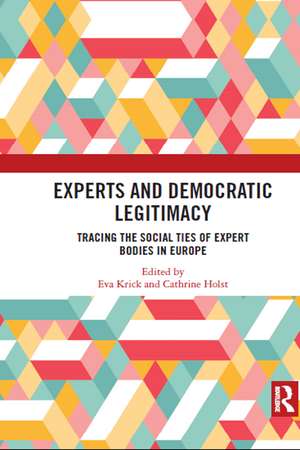Experts and Democratic Legitimacy: Tracing the Social Ties of Expert Bodies in Europe
Editat de Eva Krick, Cathrine Holsten Limba Engleză Paperback – 30 iun 2021
Expert contributors ask in what way expert bodies are subject to some of the key pressures in contemporary governance, such as democratisation, politicisation and expertisation. Based on empirical studies, the book traces the multiple social ties of expert bodies and refines the common perception of expert bodies as ‘de-politicised’ institutions that are detached from political interference and societal input. It further theorises the tension and reconcilability between reliable, independent expert knowledge on the one hand and the need for accountability and legitimacy in modern policy-making on the other hand.
Refining the detached, de-politicised image of non-majoritarian institutions, Experts and Democratic Legitimacy will be of great interest to scholars of European studies, political and social theory, modern governance and policy-making. This book was originally published as a special issue of European Politics and Society.
| Toate formatele și edițiile | Preț | Express |
|---|---|---|
| Paperback (1) | 381.59 lei 6-8 săpt. | |
| Taylor & Francis – 30 iun 2021 | 381.59 lei 6-8 săpt. | |
| Hardback (1) | 764.20 lei 6-8 săpt. | |
| Taylor & Francis – 19 noi 2019 | 764.20 lei 6-8 săpt. |
Preț: 381.59 lei
Nou
Puncte Express: 572
Preț estimativ în valută:
73.02€ • 76.44$ • 60.42£
73.02€ • 76.44$ • 60.42£
Carte tipărită la comandă
Livrare economică 08-22 aprilie
Preluare comenzi: 021 569.72.76
Specificații
ISBN-13: 9781032085500
ISBN-10: 1032085509
Pagini: 144
Dimensiuni: 174 x 246 x 8 mm
Greutate: 0.26 kg
Ediția:1
Editura: Taylor & Francis
Colecția Routledge
Locul publicării:Oxford, United Kingdom
ISBN-10: 1032085509
Pagini: 144
Dimensiuni: 174 x 246 x 8 mm
Greutate: 0.26 kg
Ediția:1
Editura: Taylor & Francis
Colecția Routledge
Locul publicării:Oxford, United Kingdom
Public țintă
Postgraduate and UndergraduateCuprins
1. The socio-political ties of expert bodies. How to reconcile the independence requirement of reliable expertise and the responsiveness requirement of democratic governance 2. Reconciling credibility and accountability: How expert bodies achieve credibility through accountability processes 3. Creating participatory expert bodies. How the targeted selection of policy advisers can bridge the epistemic-democratic divide 4. The role of advisory bodies in the emergence of cross-cutting policy issues: comparing innovation policy in Norway and Germany 5. No epistocracy without representation? The case of the European Central Bank 6. Expertisation or greater representation? Evidence from Norwegian advisory commissions 7. How does expert knowledge travel between EU institutions? The case of the Transatlantic Trade and Investment Partnership 8. Epistemic democracy and the quality of government
Notă biografică
Eva Krick is researcher at ARENA – Centre for European Studies, University of Oslo. Her research focuses on European consensus democracies and the relationship of expert knowledge and democratic legitimacy in modern governance.
Cathrine Holst is professor at the Department of Sociology and Human Geography, and researcher at ARENA – Centre for European Studies, University of Oslo. Her work focuses inter alia on political and social theory, the role of experts in policy-making and on gender policy in Europe.
Cathrine Holst is professor at the Department of Sociology and Human Geography, and researcher at ARENA – Centre for European Studies, University of Oslo. Her work focuses inter alia on political and social theory, the role of experts in policy-making and on gender policy in Europe.
Descriere
Experts and Democratic Legitimacy challenges the technocratic reading of expert bodies, such as central banks, advisory committees and regulatory agencies. This book was originally published as a special issue of European Politics and Society.
